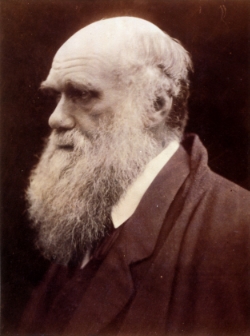Charles Darwin
1809 – 1882
Survival of the fittest
This book is about the next species after Homo sapiens. The major question is how this species will emerge with secondary questions regarding the timing of this event and the nature of the new species. Charles Darwin is the prime character in describing the prime candidate for the "how." Up until today, for the billions of years that we have had life on Earth, new species have appeared through a process we call evolution. Evolution consists of two processes: 1) Random genetic changes to a living organism and 2) Natural selection. It is Charles Darwin that is generally credited with proposing the second of these processes in his historic book published in 1859 On the Origin of Species. At about the same time another naturalist, Alfred Russel Wallace, had proposed essentially the same thing.
At the time of Charles Darwin's life, it was generally recognized that all living organisms, categorized into different species, had variations within these species that appeared spontaneously over time. The genome and the exact genetic mechanisms underlying these variations were not known. However, Darwin observed that individuals with certain variations tended to succeed in propagating future generations while others did not. In his seminal publication, he attributed this success to a process he called "natural selection"—characterized as "the survival of the fittest." That is, there is something in the environment that "selects" certain variants of organisms to succeed and others to fail. Regardless of what caused the variation within species, there was something about certain characteristics that enabled some of the organisms to thrive or better adapt to natural conditions in the environment. Specifically, it enabled them to have more offspring. Those environmental conditions could be almost anything such as climate, food and water sources, predators, competitors for food, infections, geology and other physical features and many more. The genetic variations in the organisms are thus reflected in their ability to adapt to these natural conditions; such as the ability to survive in the particular climate, ability to avoid predation, ability to be a predator, good digestion, better metabolism, resistance to infection, smarter brains, ability to attract mates and many more. In essence, natural selection enables certain individuals with certain characteristics to procreate more than individuals without those characteristics, thus causing that species to survive and ultimately to evolve.
Although natural selection is a primary process in evolution, it is incomplete as an explanation for how new species emerge in the process of evolution. Speciation is more complicated than that.
Evolution by Darwinian natural selection or Darwinian evolution is one of four major mechanisms explored in this book that could lead to the creation of our successor species. The other mechanisms are catastrophe, genetic engineering, and electronic evolution.
Click on links to other players in my journey below.
Ardi * Aubrey de Grey * Bill Joy * C. Owen Lovejoy * Carl Linneaus * Charles Darwin * CRISPR *
Daniel E. Koshland, Jr * Elizabeth Kolbert * Ernst Mayr * Eugene E. Harris * Gregor Mendel * Henry Markram *
Ian Tattersall * Jean-Baptiste Lamarck * John Markoff * Katherine Pollard * Kevin de Queiroz * Lucy *
McBrearty and Brooks * Miguel Nicolelis * Paul Allen * Paul Berg * R.A.Fisher * Scott Blois * Singularity *
Stephen Jay Gould * Svante Pååbo * Sydney Brenner * Terry Sejnowski * Theodosius Dobzhansky *
